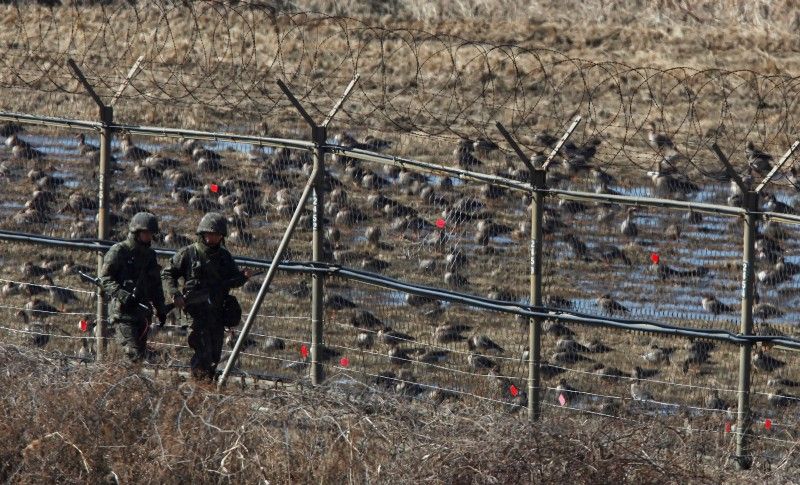We’ve written a number of stories about how environmental changes can shape geopolitics, but here’s a story of the moment in which geopolitics decisively reshape the environment.
The mile-wide ribbon of demilitarized territory (DMZ) that separates North and South Korea meanders along one of the most heavily guarded borders in the world. Bounded by barbed wire and scoured by snipers, it’s no place for humans to tread. As a result, we have learned from Smithsonian magazine, it has become an unlikely sanctuary for dozens of endangered flora and fauna, including two rare species of crane (the red-crowned and white-naped, for the bird nerds among you) often found in classical Asian art. Any rapprochement between North and South that eases border tensions is sure to ruffle some (actual) feathers.More from GZERO Media
- YouTube
The shifting geopolitical landscape and uncertainty surrounding the future of AI have stirred anxiety among those gathered in Davos. Yet, there are glimmers of hope. “The most important thing for me is really to turn the anxiety into action," said Teresa Hutson, Corporate Vice President of Microsoft.
- YouTube
Ian Bremmer's Quick Take: In his address at Davos, Trump laid out bold plans for oil, China trade, the evolving Russia-Ukraine issue, and more—setting up big shifts in US strategy. How much will stick? Ian Bremmer examines in this Quick Take.
John F Kennedy and his wife Jackie Kennedy in the Lincoln Continental in Dallas on November 22, 1963, just moments before he was assassinated.
Reuters
Migrants line up to leave the United States for Mexico after being deported across the Paso del Norte international border bridge after President Donald Trump promised mass deportation operation, as seen from Ciudad Juarez, Mexico, on Jan. 23, 2025.
REUTERS/Jose Luis Gonzalez
As Donald Trump begins to roll out his plans for the “largest deportation operation in history,” Mexico, the country with the highest number of unauthorized citizens living in the US — some 4 million people — is preparing to welcome back thousands of deportees. Mexico plans to send anyone from elsewhere back to their home countries.
President Donald Trump attends a bilateral meeting with Chinese President Xi Jinping during a G20 leaders summit in Osaka, Japan, in 2019.
REUTERS/Kevin Lamarque
During his first week in office, Donald Trump took steps to withdraw the US from two major international commitments: the Paris Climate Agreement and the World Health Organization. Will this create opportunities for other global powers, not least China, to fill the void?
President Donald Trump makes a special address remotely during the 55th annual World Economic Forum in Davos, Switzerland, on Jan. 23, 2025.
REUTERS
GZERO’s very own Tony Maciulis is in the Alps reporting from the 55th World Economic Forum in Davos, Switzerland. Today he decided the theme should be turning anxiety and fear into action.
Syria's police force.
Reuters
As it struggles to rebuild Syria’s police force and maintain law and order, the new regime of Hayat Tahrir al-Sham, or HTS, isintegrating Islamic teachings in the training of recruits.
Viewpoint: With Putin’s protection, is Lukashenko’s reelection in Belarus a foregone conclusion?
January 23, 2025
Russia's President Vladimir Putin and Belarus' President Alexander Lukashenko take part in a signing ceremony following a meeting of the Supreme State Council of the Union State of Russia and Belarus in Minsk, Belarus, on Dec. 6, 2024.
Sputnik/Gavriil Grigorov/Pool via REUTERS
Ahead of Sunday’s election in Belarus, there is little doubt that Alexander Lukashenko, Europe’s longest-serving leader, will win a new term in office. After the protests that erupted following the 2020 elections, threatening his grip on power for the first time, a government crackdown supported by Russia has eliminated any opposition to the president. We sat down with Eurasia Group expert Alex Brideau to learn more about the upcoming election.
Luisa Vieira
Donald Trump had a busy first week in office, signing a deluge of executive orders on everything from immigration and the environment to the number of genders acknowledged by the US government (two).
President Donald Trump makes a special address remotely during the 55th annual World Economic Forum meeting in Davos, Switzerland, on Jan. 23, 2025.
REUTERS/Yves Herman
GZERO Publisher Evan Solomon writes that Donald Trump’s planned tariffs mean the US and Canada are headed for a trade war they don’t need over a prize they both already have.
© 2020 GZERO Media. All Rights Reserved | A Eurasia Group media company.
